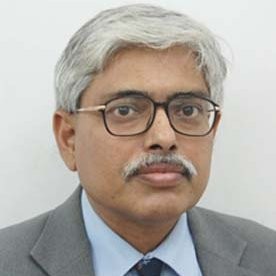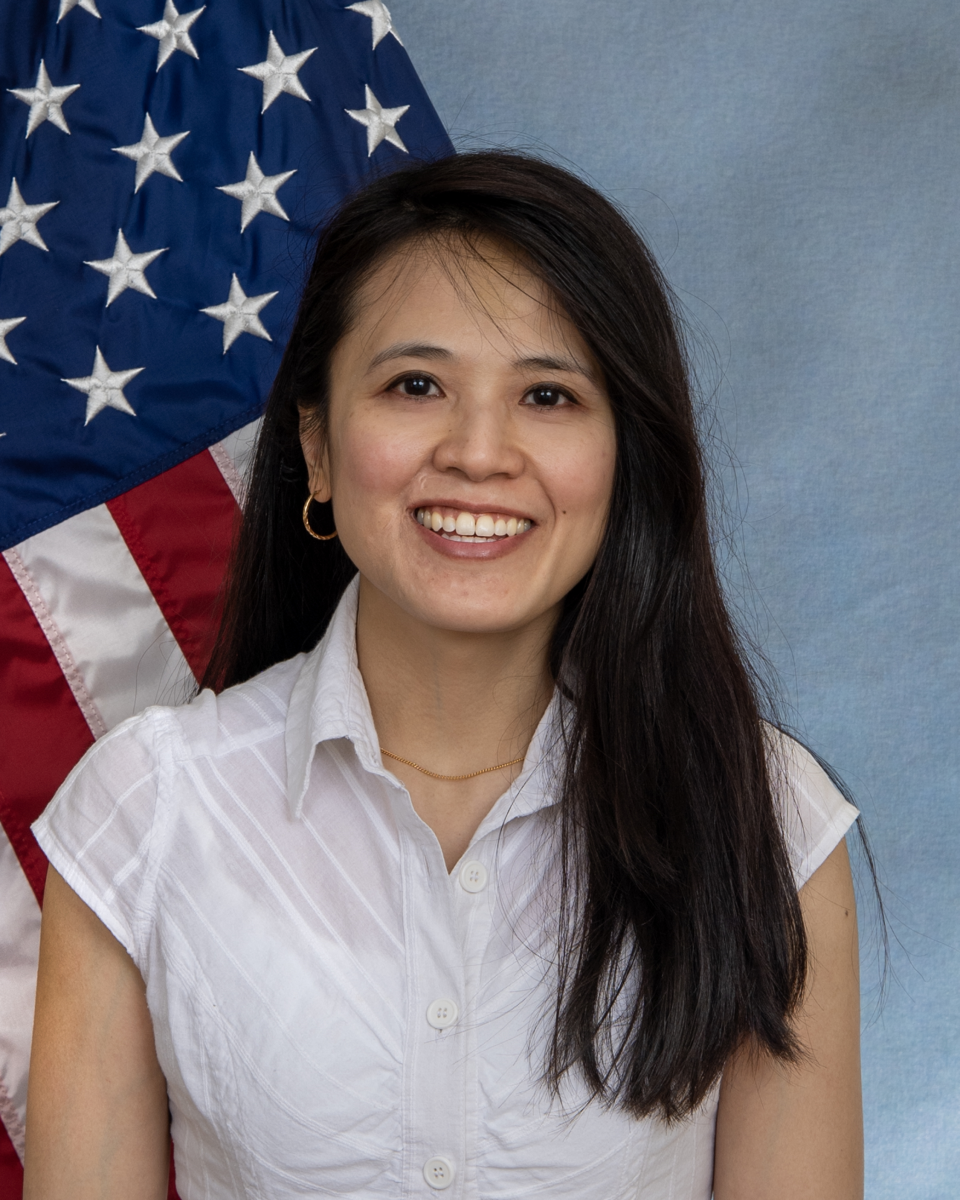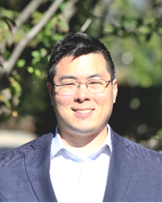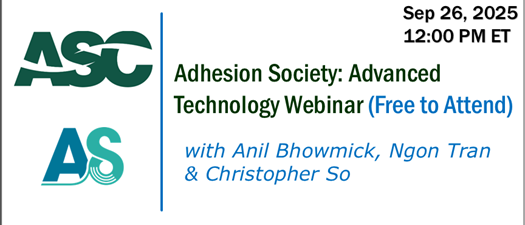Advanced Technology Webinar - Adhesion Society (FREE)
A link to the GoToWebinar platform will be provided once your registration is processed. You will need to click and enter your name and email in order to receive the JOIN link.
Event Details
This a Free to Attend webinar for everyone.
Overview
This webinar brought to you in collaboration with the Adhesion Society will highlight the award winners from the 2025 Adhesion Society meeting. The webinar will include an introduction from Christopher So (Chair, Adhesion Society ) followed by presentations from Anil Bhowmick (university of Houston) and Ngon Tran (Army Research Laboratory). Dr. Ngon Tran received the 2025 Early Career adhesion Scientist Award sponsored by ASC on the research about additives and surface treatment methods to improve the adhesion durability in composites. Prof. Anil Bhowmick received the 2025 Excellence in Adhesion Science award sponsored by 3M for his groundbreaking work on adhesion to rubber and rubber products.
Presentation Details
Prof. Anil Bhowmick's lecture will deal with the fundamental aspects of rubber to rubber bonding in raw state in presence of additives, self-healing phenomena and bonding during co-vulcanization. Behavior of joints during application will also be highlighted. The lecture will be interesting to researchers and students in materials science and chemical engineering and professionals in rubber and polymer industries.
Ngon Tran's presentation will focus on role of additives and surface treatments methods to study adhesion durability in underwater substrates.
Agenda
Adhesion Aspects in Rubber and Rubber Products by Prof. Anil Bhowmick
- Fundamental aspects of rubber-to-rubber bonding
- Self-healing phenomena
- Bonding during co-vulcanization
- Rubber products and adhesion
Designing Hydrogen Bonding Additives and Optimizing Surface Treatments to Improve Underwater Adhesion Durability in Composites by Ngon Tran
- Adhesive performance of polydopamine as a surface treatment
- Adhesive performance of trizma buffer as a surface treatment
- Adhesive performance of epoxy formulations with additives consisting of varying levels of cooperative hydrogen-bonding capabilities
- Using x-ray photoelectron spectroscopy and dynamic mechanical analysis (DMA) to understand the outcomes of adhesive performance
Who Should Attend?
This webinar is ideal for professionals in technical and business roles eager to learn about the latest research in adhesion science. The webinar will be applicable to both new and experienced professionals in the various adhesive and sealant markets.
SPEAKERS
Dr. Anil K. Bhowmick
Research Professor, Rubber Science and Technology
Cullen College of Engineering - University of Houston

Professor Anil K. Bhowmick is currently a Research Professor at the Department of Chemical and Biomolecular Engineering, the University of Houston, USA. He is a globally recognized expert in polymer science and engineering, with decades of research in elastomers, adhesion science, and nanocomposites. His work has shaped both academic and industrial practices in rubber technology. He has more than six hundred peer reviewed international journal publications in these fields, 35 book chapters and ten books to his credit. He received the 2021 J. L. White Innovation award from the Polymer Processing Society, USA and 2022 Melvin Mooney Distinguished Technology award of the American Chemical Society’s Rubber Division. He was also the 2002 winner of the Chemistry of Thermoplastic Elastomers award, the 1997 winner of the George Stafford Whitby award of the Rubber Division, American Chemical Society, 2019 Fred E. Schwab Education Award of the Society of Plastics Engineers, USA for innovative research and teaching, and 2001 K.M. Philip award of the All India Rubber Industries Association for outstanding contributions to the growth and development of rubber industries in India. He is on the Editorial Board of Rubber Chemistry and Technology (USA), Journal of Applied Polymer Science (USA), Polymers and Polymer Composites (UK), Polymers for Advanced Technology (Europe), Nano-Micro Letters (UK), Processes (Germany), Journal of Rubber Research (Malaysia) and Natural Rubber Research (India). He is a former Editorial Board member of the Journal of Adhesion Science and Technology.
Dr. Ngon Tran

After graduating with a PhD in Chemistry from the University of California at Davis, Dr. Ngon Tran joined the Extreme Science and Materials Division at DEVCOM Army Research Laboratory (ARL). She has thoroughly enjoyed participating in a diverse variety of research projects that use surface science, synthesis and formulation to enhance underwater adhesion (of structural adhesives), enhance temperature tolerances, and facilitate the reintroduction of recycled carbon fibers in composites. Ngon is a recipient of the 2024 Early Career Scientist Award from the Adhesion Society for her pioneering contributions to the field of adhesion science, particularly her innovative work on surface functionalization methods including clustered hydroxyl groups for improved hydrolysis resistance. She has 2 patents and 26 peer-reviewed publications.
Dr. Christopher So

CHRISTOPHER SO is a Materials Research Scientist at the Naval Research Laboratory in Washington, DC, where he also held a National Research Council post-doctoral fellowship. In 2012, he finished his PhD at the University of Washington where he worked on the dependence of peptide sequence and their binding mechanism with atomically flat surfaces using in situ scan probe microscopy, peptide synthesis, and interfacial spectroscopy. He was awarded a T32 NIH Ruth L. Kirschstein National Research Service Award using gold binding peptides to display antibodies from gold nanoparticles for cancer therapy during his last couple of years at UW. After receiving his Ph.D. in Materials Science with Prof. Mehmet Sarikaya, he accepted a National Research Council post-doctoral fellowship with Dr. Kathryn Wahl at the Naval Research Laboratory to study the natural adhesive produced by barnacles. Continuing his interest in sequence-assembly relationships in peptides and proteins, he worked to understand how natural sequences from barnacle glue formed tenacious adhesives in seawater.

